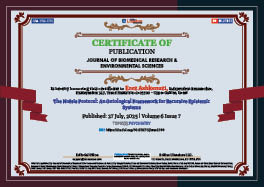Erez Ashkenazi*
Volume6-Issue7
Dates: Received: 2025-06-26 | Accepted: 2025-07-15 | Published: 2025-07-27
Pages: 948-950
Abstract
This paper introduces the Noēsis Protocol, a decentralized epistemic framework grounded in Spinoza's [1] metaphysics and formalized through the Theory of Relational Adequacy (TRA). The protocol redefines truth as recursive actualization within an evolving field of clarity (Φ), replacing static correspondence models with structural participation. A formal graph-theoretic model is presented, detailing how reflections (user-submitted expressions) are parsed into causal graphs and evaluated for adequacy. The protocol incorporates dynamic alignment with a system-wide causal model and enables governance via a novel Proof-of-Adequacy (PoA) mechanism. Applications in AI alignment, decentralized governance, and collective cognition are explored.
FullText HTML
FullText PDF
DOI: 10.37871/jbres2149
Certificate of Publication

Copyright
© 2025 Ashkenazi E, Distributed under Creative Commons CC-BY 4.0
How to cite this article
Ashkenazi E. The Noesis Protocol: An Ontological Framework for Recursive Epistemic Systems. J Biomed Res Environ Sci. 2025 Jul 27; 6(7): 988-950. doi: 10.37871/jbres2149, Article ID: JBRES2149, Available at: https://www.jelsciences. com/articles/jbres2149.pdf
Subject area(s)
References
- Spinoza B. Ethica ordine geometrico demonstrata. 1677.
- Ashkenazi E. Relational adequacy: An ontological scroll beyond time. 2025.
- Gurevich Y. Sequential abstract state machines capture sequential algorithms. ACM. 2000.
- Hofstadter DR. Gödel, Escher, Bach: An eternal golden brain. Basic Books. 1979.
- Deleuze G. Spinoza: Practical philosophy. City Lights Publishers. 1981.
- Wolfram S. A new kind of science. Wolfram Media. 2020.
- Vervaeke J. Awakening from the meaning crisis. YouTube Lecture Series. 2021.
- Lloyd S. Programming the universe. Knopf. 2006.